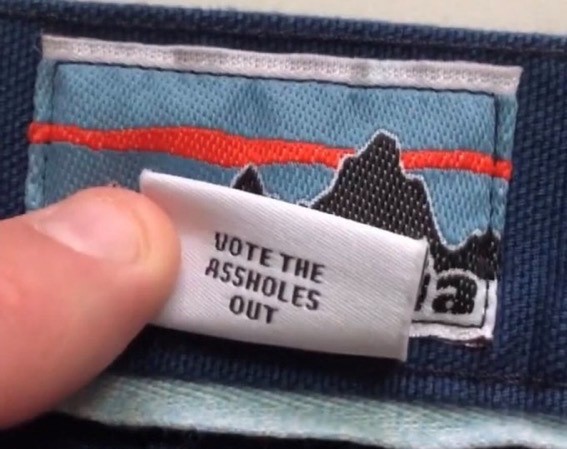Patagonia is no stranger to bold moves. Its latest is to use its clothes to make a statement about climate change. Featuring a new tag that reads “Vote the a-holes out,” the statement is an attempt to stand up to climate change deniers.
“Yvon Chouinard [Patagonia’s founder] has been saying ‘Vote the a-holes out’ for several years and it refers to politicians from any party who deny or disregard the climate crisis and ignore science, not because they aren’t aware of it, but because their pockets are lined with money from oil and gas interests,” said Patagonia spokesperson Tessa Byars.
Related: How should HR handle political talk in the new workplace?
 This is not unusual for the unusual company based in Ventura, Calif. Ahead of the 2018 midterm elections, Patagonia became one of the first consumer brands ever to make the endorsement of a specific candidate part of its brand marketing. In support of its mission that “Patagonia is in business to save our home planet,” the company endorsed two candidates, Rep. Jacky Rosen in Nevada and Sen. Jon Tester in Montana, both Democrats, for their stances on protecting public lands. The company promoted the candidates on its website, across social channels and in customer emails. Both won their elections, and some called Patagonia’s support the determining factor.
This is not unusual for the unusual company based in Ventura, Calif. Ahead of the 2018 midterm elections, Patagonia became one of the first consumer brands ever to make the endorsement of a specific candidate part of its brand marketing. In support of its mission that “Patagonia is in business to save our home planet,” the company endorsed two candidates, Rep. Jacky Rosen in Nevada and Sen. Jon Tester in Montana, both Democrats, for their stances on protecting public lands. The company promoted the candidates on its website, across social channels and in customer emails. Both won their elections, and some called Patagonia’s support the determining factor.
In the last couple of years, we’ve seen several iconic brands, including Nike, Levi’s, Gucci, Airbnb, Ben & Jerry’s, Dick’s Sporting Goods and others, take public stances on a variety of social issues, all of which were spearheaded by the CEO or founder(s). “Brand political activism” is a trend, primarily because consumers are demanding it. Over 60% of consumers want companies to stand up for the issues they are passionate about and another 66% think transparency is one of a brand’s most attractive qualities, according to recent research.

However, overt political support like Patagonia exhibited is unlikely to be matched by most companies as we approach the November elections in the United States.
A recent i4cp survey of 300 professionals found that very few CEOs have publicly revealed their political preferences. Only 2% of respondents said their CEO has publicly endorsed a candidate, and a mere 11% said their CEO has issued a corporate statement on political issues. The majority (52%) reported that their CEO “tries to be apolitical” and has taken no stance.
While conventional wisdom tells us that a strong and clearly articulated purpose and set of principles is what job seekers and consumers want today, most companies and their leaders are still unwilling to share their social and political views publicly. A big reason is the polarized political environment that exists across America.
It’s not news that Republicans and Democrats generally view issues quite differently, a reality that was highlighted by a recent CBS poll of 2,226 registered voters. The poll asked if the number of U.S. deaths from coronavirus has been “acceptable.” Nearly all (90%) of Democrats said it was not acceptable versus 10% who said it was. Republican responses were quite different: 57% said the number was acceptable versus 43% who said it wasn’t. Another dichotomy showed 73% of Republicans thought the U.S. response to the coronavirus was “going well” versus just 38% of all voters.
The same poll, which has a margin of error of 2.4%, shows stark differences in perception on other issues organizations are wrestling with. For instance, 81% of Republicans responded that the recent attention to discrimination was “too much” versus 12% of Democrats. More than half of Democrats thought more attention was needed versus just 6% of Republicans.
Related: Read more from HRE on diversity and inclusion.
This is the dilemma facing most organizations today. As companies respond internally and externally to the pandemic, social unrest, climate change and other matters of the day, the reaction is likely to be quite different depending on individual political affiliation. And in today’s “cancel culture,” taking a political or social stance can be too daunting for many organizations–the risks may outweigh the rewards.
For example, recently President Trump tweeted, “Don’t buy GOODYEAR TIRES–They announced a BAN ON MAGA HATS. Get better tires for far less!” in response to a leaked photo of an internal PowerPoint slide. Goodyear denied that they were targeting MAGA hats and later released a public statement stating that the company asks its associates to “refrain from workplace expressions in support of political campaigning for any candidate or political party, as well as similar forms of advocacy that fall outside the scope of racial justice and equity issues.”
It would appear most workers are playing nice. The same i4cp survey found that typical political debates among co-workers, even in a virtual work environment, are not having much effect, and frankly just aren’t happening. Almost 60% reported that there are no debates happening, while only 4% said that the debates that are happening are disruptive to the culture (14% said they are “no big deal”). Another 14% said the company–like Goodyear–has a specific policy banning political debates.
It won’t be surprising to see attitudes and rhetoric heat up as we get closer to the November elections, but for now it appears leaders and employees are avoiding public stances. Yet, organizations can’t forget that the attitudes underneath are as polarizing as we’ve seen. Corporations that are rolling out return-to-office plans, responses to social injustice and other issues need to be cognizant of the drastically different points of view of employees–nobody seems to see these issues the same.
If you are struggling with all of this, take solace in the fact that today is a more complex time than most of us have ever seen. Post-election, post-pandemic, perhaps attitudes will change. As one survey respondent wrote:
“It is hard to tell what is the election and what is the pandemic. Under normal circumstances, the election impacts everyone’s business decisions. There is always a slowdown on spend until the election, and then an uptick after the new year. I do not expect that to happen, this is much more complicated. We have a lot of remote workers (under normal circumstances). Most don’t mention politics, but I hear frequently–’cannot wait until November’.”
*
Portions of this article were excerpted from Oakes’ forthcoming book, CULTURE RENOVATION, which will be published by McGraw Hill on Dec. 15, 2020.

